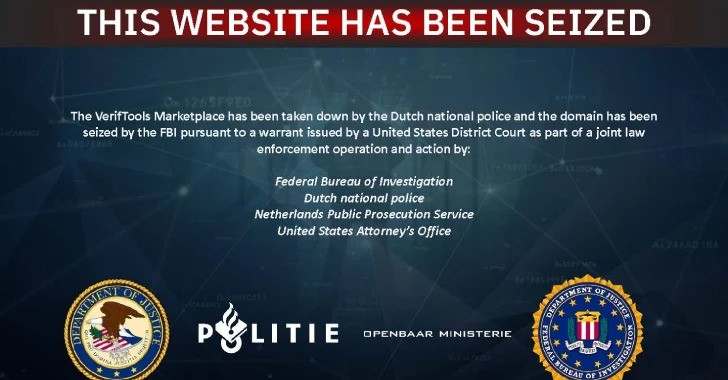VerifTools: A Global Fake ID Marketplace
Authorities in the United States and the Netherlands have taken down VerifTools, a notorious darknet marketplace known for selling counterfeit IDs, passports, and forged documents to cybercriminals worldwide. The FBI seized two domains (verif[.]tools, veriftools[.]net) and multiple servers in Amsterdam, redirecting them to an official takedown notice.
However, the operators quickly announced on Telegram that the service has already relaunched under a new domain, showing how resilient these underground networks can be.

How VerifTools Was Used by Cybercriminals
According to the U.S. Department of Justice (DoJ), VerifTools allowed criminals to bypass online Know Your Customer (KYC) verification systems by generating realistic fake IDs. This gave them unauthorized access to bank accounts, cryptocurrency platforms, and other online services.
-
Fake IDs for all 50 U.S. states and multiple countries were available
-
Prices started as low as $9
-
The operation generated an estimated $6.4 million in illegal profits
A Reddit user also claimed the site’s operators reassured customers that their funds were safe and promised to restore the service, highlighting the underground community’s trust-based ecosystem.
International Crackdown and Consequences
The Dutch National Police described VerifTools as one of the largest providers of fraudulent identity documents. In addition to two physical servers, authorities seized 21 virtual servers containing the site’s infrastructure and data for forensic analysis.
Acting U.S. Attorney Ryan Ellison warned:
“The internet is not a refuge for criminals. If you build or sell tools that let offenders impersonate victims, you are part of the crime.”
In the Netherlands, crimes like forgery and deploying fake payment instruments can lead to six years in prison.
Why It Matters
Fake ID marketplaces like VerifTools pose a major threat to online safety. By bypassing KYC verification, criminals can launch fraud schemes such as:
-
Bank helpdesk fraud
-
Phishing scams
-
Cryptocurrency theft
The takedown demonstrates international cooperation between U.S. and Dutch authorities — but the rapid relaunch of VerifTools shows how difficult it is to permanently shut down cybercriminal marketplaces.

